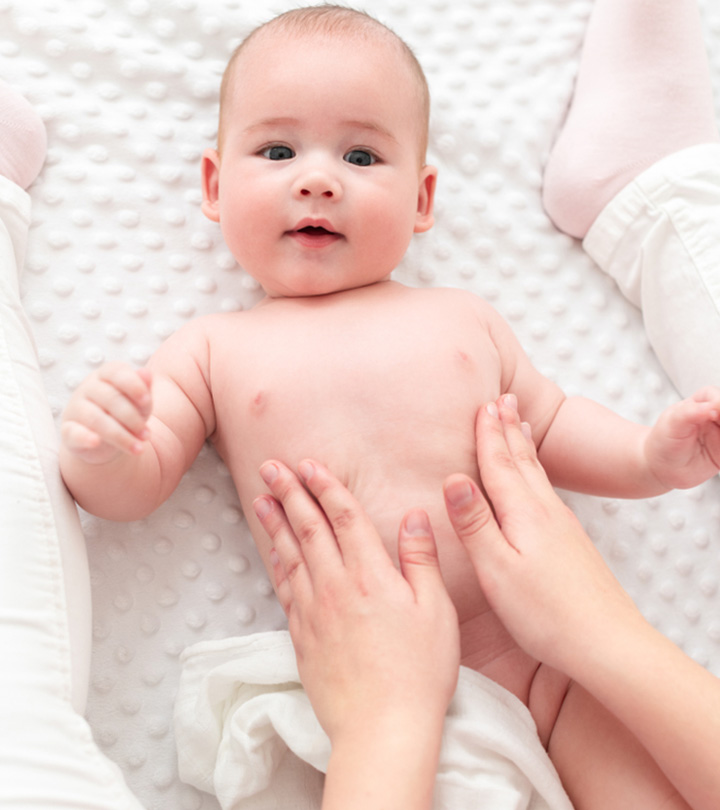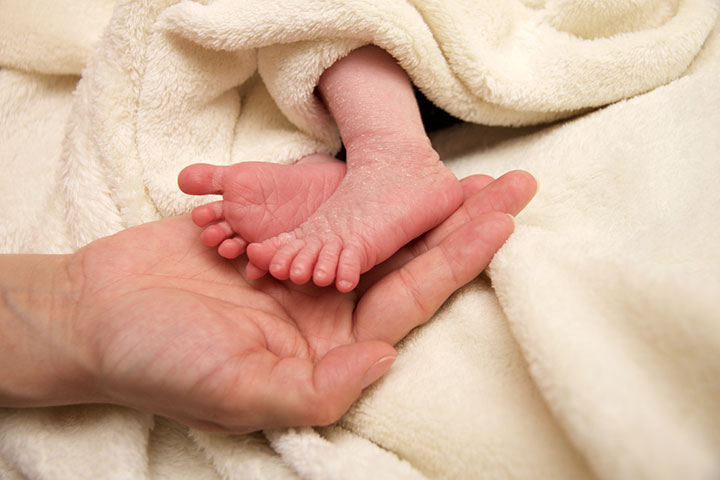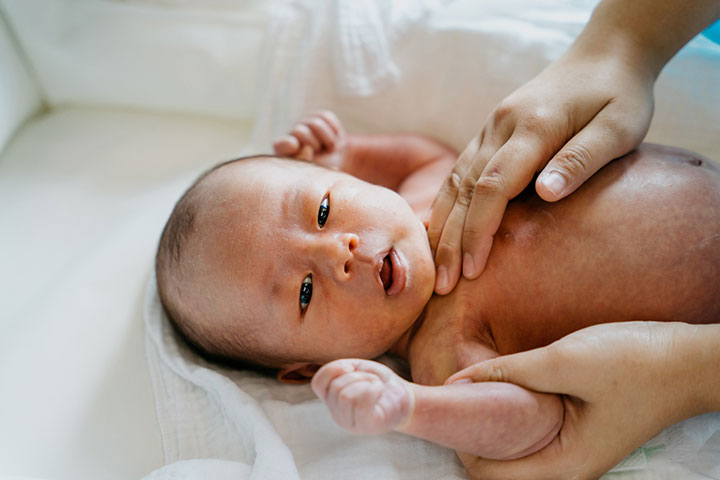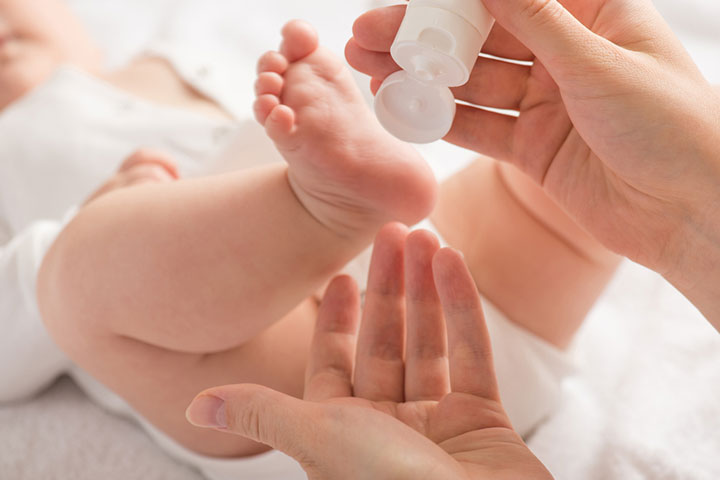Many new parents wonder if it is safe to use lotions on newborns. However, gentle cleaning and moisturizing help prevent germs, dryness, and rashes from affecting the baby’s gentle skin.
Baby lotions help keep their skin soft and healthy, especially during dry seasons (1). However, ensure that the moisturizer does not irritate their skin or make it too moist or sweaty.
Read this post to learn about the indications, safety measures, and tips to keep in mind while choosing the right moisturizer for your baby.
Do Newborns Need Lotion?
Baby’s have a protective layer on their skin when in the mother’s womb. This layer is called vernix caseosa, and it protects the infant’s skin from drying up too much. Post-birth, the vernix begins to shed, which gives a flaky appearance to the baby’s skin. This process is quite normal. However, newborns might not need lotion or baby oil as their skin remains moist until the vernix leaves the skin (2).
When To Use Lotion On A Newborn?
The tender skin of your newborn requires attention as their routine feedings. To protect the baby’s skin from drying and maintaining a soft texture, you should apply a gentle product to moisturize the skin. Therefore, it is important to know when to use lotion and moderation to suit the baby’s sensitive skin.
Here’s when you should apply lotion on a newborn (3):
- Apply lotion all over the body immediately after bath. This helps reduce the chances of the baby’s skin becoming dry and flaky. Also, use mild baby soap for bathing as it reduces the risk of excessive dryness.
- Use lotion on areas that look dry. It helps heal the skin and keep it moist. If you think that your baby’s skin is drier than usual, you should apply lotion two to four times a day.
What Are The Safety Measures To Follow While Applying Lotion?
Here are some safety measures you should follow when applying lotion to your baby’s skin (3):
- Make sure there is no contact with the eyes. Babies tend to put their hands in their mouth and eyes, and if you have applied a generous coat of cream, it may cause a reaction.
- Apply lotion immediately after a bath to prevent dry, irritable skin.
- Don’t use a moisturizer that contains food and plant products as they may disrupt the skin and cause irritation and allergic reactions.
- Don’t dip your finger or a spoon to take out the cream from the bottle of lotion. This will contaminate the cream.
- Use flip-top or twist-up lotion tubes. Here, direct contact from the tube to the infant’s skin will lower the risk of contamination.
- Use a lotion for your baby’s skin more frequently and consult your doctor if there is persistent dryness.
How To Choose The Right Lotion For Your Newborn?
Some tips you can follow in choosing safe baby products, such as lotion, include (4):
- Professional help: Talk to your baby’s pediatrician and choose among the products they suggest to ensure the product is safe for the baby.
- Read instructions: Read the instructions and ingredients on the product. Try to avoid anything that has many chemicals and toxins as it could lead to irritated skin.
- Be well informed: Try to find information from other reputable sources regarding the lotion. You can check online or take direct advice from skin specialists.
- Go for a mild lotion:Pick a specially designed lotion for babies as it will be mild. A strong cosmetic is not recommended for babies as it may contain high levels of chemicals.
- Avoid fancy lotions: To ensure your baby’s skin stays soft and healthy, use a fragrance-free baby moisturizer. Avoid using lotions with a strong odor as they can cause skin irritation.
- Check the ingredients: Consider a hypoallergenic lotion. Some babies could be allergic to creams and other products, so before applying anything on their skin, ensure you have read about its ingredients.
Adding on to the numerous benefits of breast milk, some people also use it to make a baby lotion at home. Kyra Henry, a mother of three children, shares the breastmilk lotion recipe she used for her son. She says, “I’m really picky about the things that I use on my son’s skin. I use it (breast milk lotion) on my son to give him back massages and when he has a cradle cap. I used a teaspoon and a half of Candelilla wax (you can also use beeswax). Put it in a glass bowl placed upon a pan of boiling water. Then I pour a cup and half of all-natural coconut oil into the bowl. Let everything dissolve nicely. I’m going to be using four ounces of breast milk while whisking and a few drops of Vitamin E oil. I am going to put it in the fridge for about an hour, let it get thicker and then whisk more. I’m going to store it in a container and seal it tight (i).”
What Are Some Ingredients To Avoid In Baby Lotions?
Many everyday products, including shampoo, lotion, baby oil, and body wash, contain ingredients that may be harmful to your baby’s skin. Here are key ingredients to watch out for and avoid when selecting baby lotions (5):
- Parabens: These chemicals are known to disrupt hormone levels. To steer clear of them, check the label for ingredients such as propyl-, butyl-, isopropyl, and iso-butyl parabens.
- Formaldehyde-releasing preservatives: Chemicals in this category, such as DMDM hydantoin, imidazolidinyl urea, and sodium hydroxymethylglycinate, should be avoided as they can potentially cause skin issues and allergies.
- Isothiazolinones: These chemicals can lead to severe skin rashes. Despite being banned in other countries, they are still present in some products that claim to be hypoallergenic.
Therefore, it is ideal to talk to your child’s doctor or a dermatologist to choose lotions that have been tested and deemed safe for use among babies.
When To Consult A Doctor?
Dry skin is not an unusual condition, and regular moisturizing could keep it healthy. But if your baby’s skin turns red accompanied by flakiness and itchiness, it could be a sign of eczema, for which you should visit your baby’s pediatrician or dermatologist . The dermatologist will prescribe you medication and suggest the right home remedies for infant skincare (6).
Although newborns may not need lotion, it can be used occasionally to keep your baby’s skin healthy, rash-free, and moisturized. However, ensure you follow the safety tips while applying lotion on newborns. Carefully read the label before using lotion on your baby and stop using it immediately if you notice any adverse reactions. Since a newborn’s skin is highly sensitive, you must use baby lotions approved by doctors. You can consult your pediatrician in case of any doubt and if your baby shows signs of concern after the application of the lotion.
Key Pointers
- To prevent baby skin from drying, a gentle moisturizer can be used immediately after bathing.
- Use flip-flop or twist-up lotion bottles that prevent contamination since the lotion comes into direct contact with the baby’s skin.
- Consult your pediatrician to choose the right product that suits your little one’s skin.
Take a look at this video for a list of the top 10 pediatrician approved baby products that you can use for your little one.














